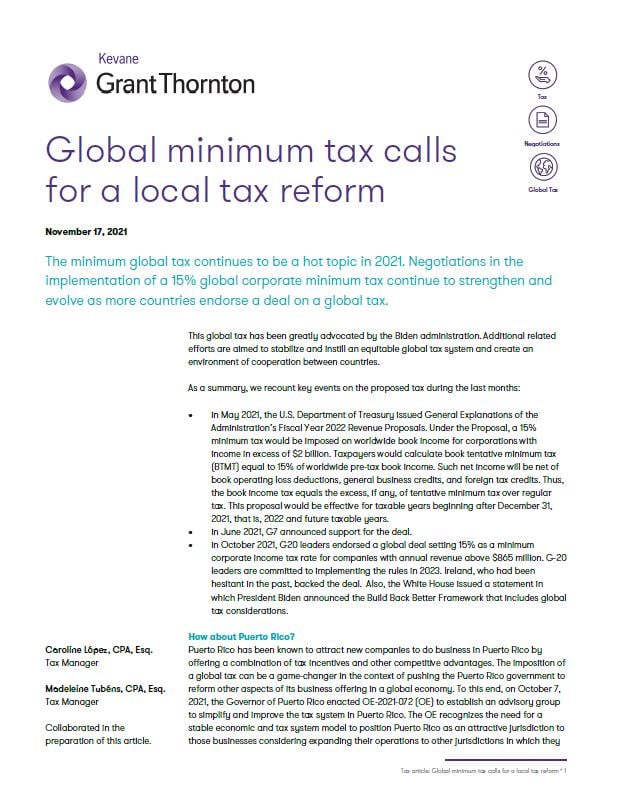-
Financial statements audits
Financial statement audits
-
Compliance audits
Compliance audits
-
Compilations and reviews
Compilations and audit
-
Agreed-upon procedures
Agreed-upon procedures
-
Corporate and business tax
Our trusted teams can prepare corporate tax files and ruling requests, support you with deferrals, accounting procedures and legitimate tax benefits.
-
International tax
Our teams have in-depth knowledge of the relationship between domestic and international tax laws.
-
Tax compliance
Business Tax
-
Individual taxes
Individual taxes
-
Estate and succession planning
Estate and succession planning
-
Global mobility services
Through our global organisation of member firms, we support both companies and individuals, providing insightful solutions to minimise the tax burden for both parties.
-
Sales and use tax and indirect taxes
SUT/ VAT & indirect taxes
-
Tax incentives program
Tax incentives program
-
Transfer Pricing Study
The laws surrounding transfer pricing are becoming ever more complex, as tax affairs of multinational companies are facing scrutiny from media, regulators and the public

-
Business consulting
Our business consulting services can help you improve your operational performance and productivity, adding value throughout your growth life cycle.
-
Forensic and investigative services
At Grant Thornton, we have a wealth of knowledge in forensic services and can support you with issues such as dispute resolution, fraud and insurance claims.
-
Fraud and investigations
The commercial landscape is changing fast. An ever more regulated environment means organizations today must adopt stringent governance and compliance processes. As business has become global, organizations need to adapt to deal with multi-jurisdictional investigations, litigation, and dispute resolution, address the threat of cyber-attack and at the same time protect the organization’s value.
-
Dispute resolutions
Our independent experts are experienced in advising on civil and criminal matters involving contract breaches, partnership disputes, auditor negligence, shareholder disputes and company valuations, disputes for corporates, the public sector and individuals. We act in all forms of dispute resolution, including litigation, arbitration, and mediation.
-
Business risk services
We can help you identify, understand and manage potential risks to safeguard your business and comply with regulatory requirements.
-
Internal audit
We work with our clients to assess their corporate level risk, identify areas of greatest risk and develop appropriate work plans and audit programs to mitigate these risks.
-
Service organization reports
As a service organization, you know how important it is to produce a report for your customers and their auditors that instills confidence and enhances their trust in your services. Grant Thornton Advisory professionals can help you determine which report(s) will satisfy your customers’ needs and provide relevant information to your customers and customers’ auditors that will be a business benefit to you.
-
Transactional advisory services
Transactions are significant events in the life of a business – a successful deal that can have a lasting impact on the future shape of the organizations involved. Because the stakes are high for both buyers and sellers, experience, determination and pragmatism are required to bring deals safely through to conclusion.
-
Mergers and acquisitions
Globalization and company growth ambitions are driving an increase in M&A activity worldwide as businesses look to establish a footprint in countries beyond their own. Even within their own regions, many businesses feel the pressure to acquire in order to establish a strategic presence in new markets, such as those being created by rapid technological innovation.
-
Valuations
We can support you throughout the transaction process – helping achieve the best possible outcome at the point of the transaction and in the longer term.
-
Recovery and reorganization
We provide a wide range of services to recovery and reorganisation professionals, companies and their stakeholders.
This global tax has been greatly advocated by the Biden administration. Additional related efforts are aimed to stabilize and instill an equitable global tax system and create an environment of cooperation between countries.
As a summary, we recount key events on the proposed tax during the last months:
- in May 2021, the U.S. Department of Treasury issued General Explanations of the Administration’s Fiscal Year 2022 Revenue Proposals. Under the Proposal, a 15% minimum tax would be imposed on worldwide book income for corporations with income in excess of $2 billion. Taxpayers would calculate book tentative minimum tax (BTMT) equal to 15% of worldwide pre-tax book income. Such net income will be net of book operating loss deductions, general business credits, and foreign tax credits. Thus, the book income tax equals the excess, if any, of tentative minimum tax over regular tax. This proposal would be effective for taxable years beginning after December 31, 2021, that is, 2022 and future taxable years.
- in June 2021, G7 announced support for the deal.
- in October 2021, G20 leaders endorsed a global deal setting 15% as a minimum corporate income tax rate for companies with annual revenue above $865 million. G-20 leaders are committed to implementing the rules in 2023. Ireland, who had been hesitant in the past, backed the deal. Also, the White House issued a statement in which President Biden announced the Build Back Better Framework that includes global tax considerations.
How about Puerto Rico?
Puerto Rico has been known to attract new companies to do business in Puerto Rico by offering a combination of tax incentives and other competitive advantages. The imposition of a global tax can be a game-changer in the context of pushing the Puerto Rico government to reform other aspects of its business offering in a global economy. To this end, on October 7, 2021, the Governor of Puerto Rico enacted OE-2021-072 (OE) to establish an advisory group to simplify and improve the tax system in Puerto Rico. The OE recognizes the need for a stable economic and tax system model to position Puerto Rico as an attractive jurisdiction to those businesses considering expanding their operations to other jurisdictions in which they can expand their operations. In Puerto Rico, the constant changes over the last few years in the tax system and increasing compliance requirements make applying current tax rules confusing and onerous since the tendency has been on shifting the oversight burdens to the taxpayer and tax preparers.
The enactment of the OE has triggered a massive discussion among professionals in taxes and economy to brainstorm on how the reform should look like. Topics of discussion include the reinforcement of the technological infrastructure of the Puerto Rico Treasury Department, streamlining municipal taxes and creating new consumption taxes. This new tax reform will need to consider the constraints that the national debt and with that, the intervention of the Financial Oversight and Management Board for Puerto Rico has caused. Also, the US Treasury has been knocking on the door to push for an expiration date to the 4% excise tax imposed by Act 154-2010. Act 154-2010 imposed a temporary 4% excise tax on the purchase of certain products manufactured in Puerto Rico. Although the tax was scheduled to end in 2016, its due date has been continuously extended. The removal of the tax will reduce a key income stream for Puerto Rico and sits as an additional factor to consider in the analysis. Although simplifying and stabilizing our tax system is a move forward for competitiveness, it is just a steppingstone within a more complex framework. To position Puerto Rico as a well-rounded competitive jurisdiction, efforts must tackle other areas of improvement such as removing the red tape surrounding the request of business licenses during an initial set up and stabilizing the crisis of the electric power system.
Caroline López, CPA, Esq.
Tax Manager
Madeleine Tubens, CPA, Esq.
Tax Manager
Collaborated in the preparation of this article.


